| |
| |
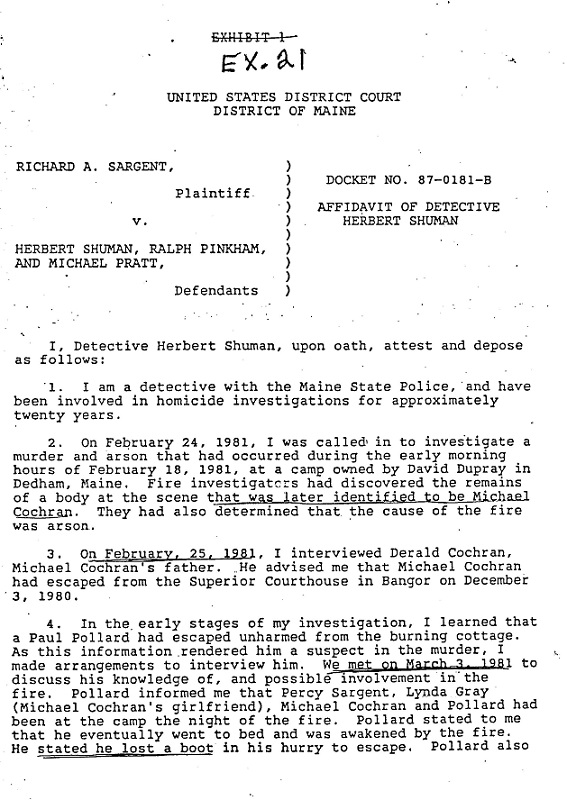 |
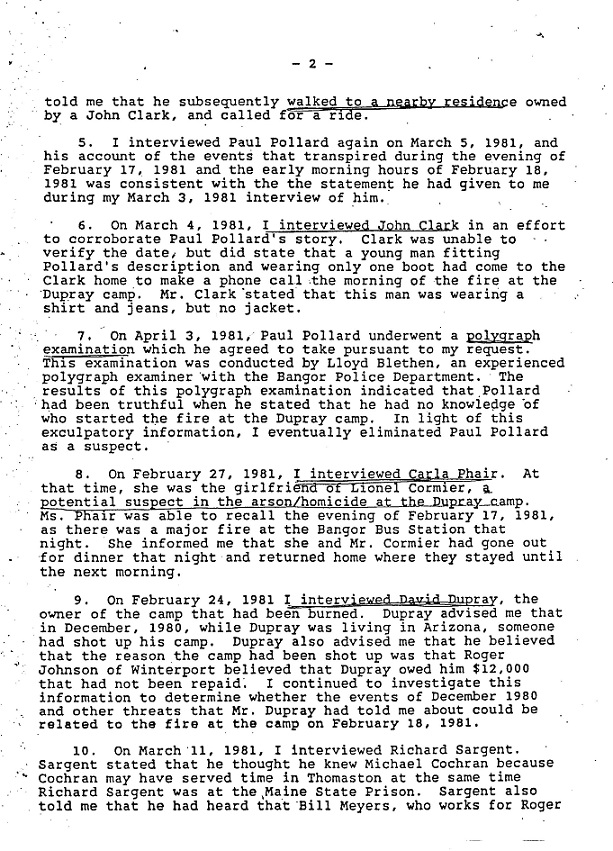 |
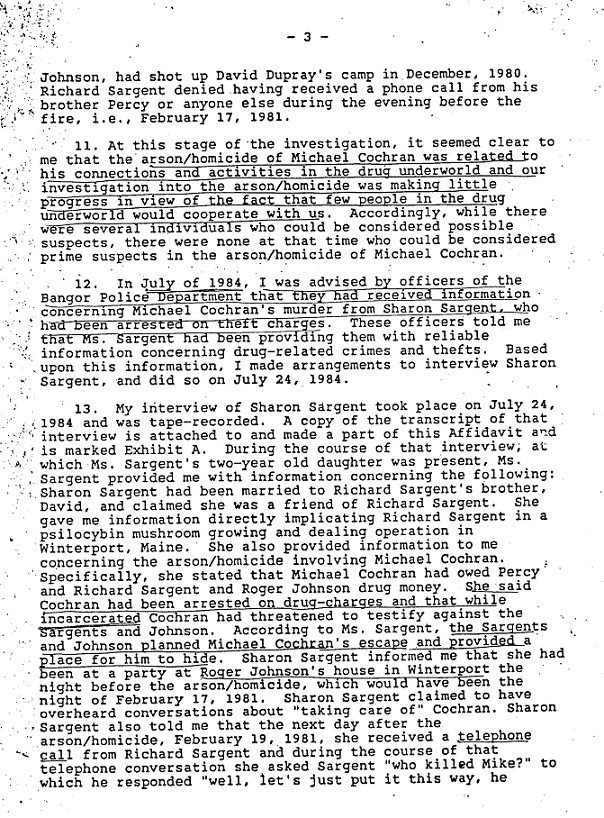 |
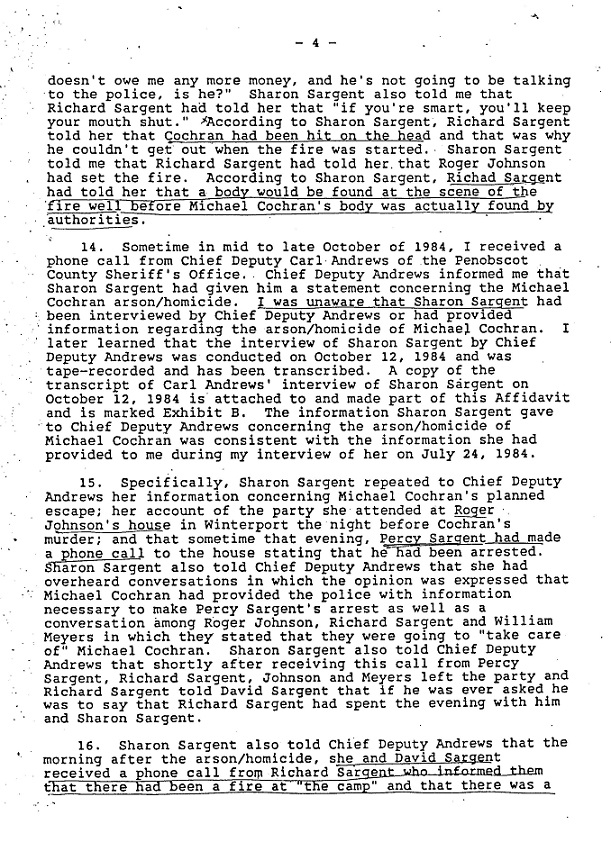 |
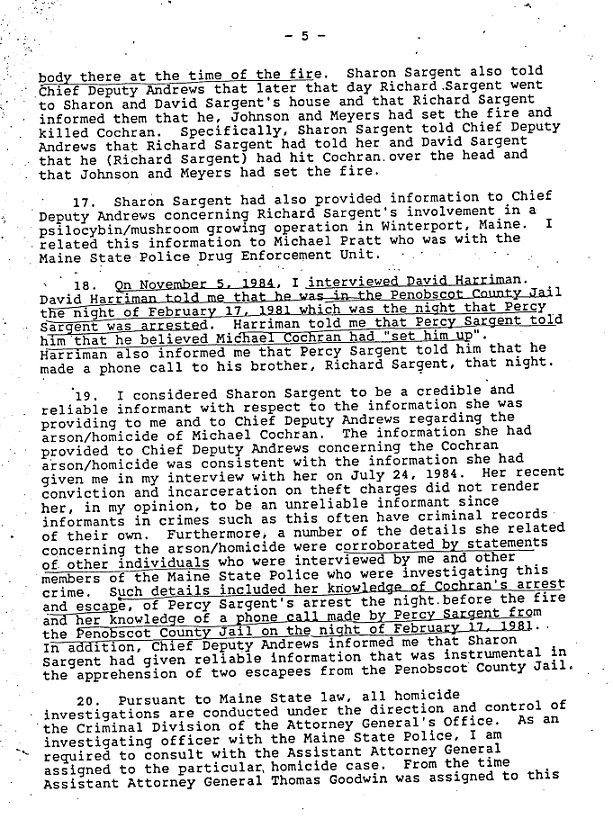 |
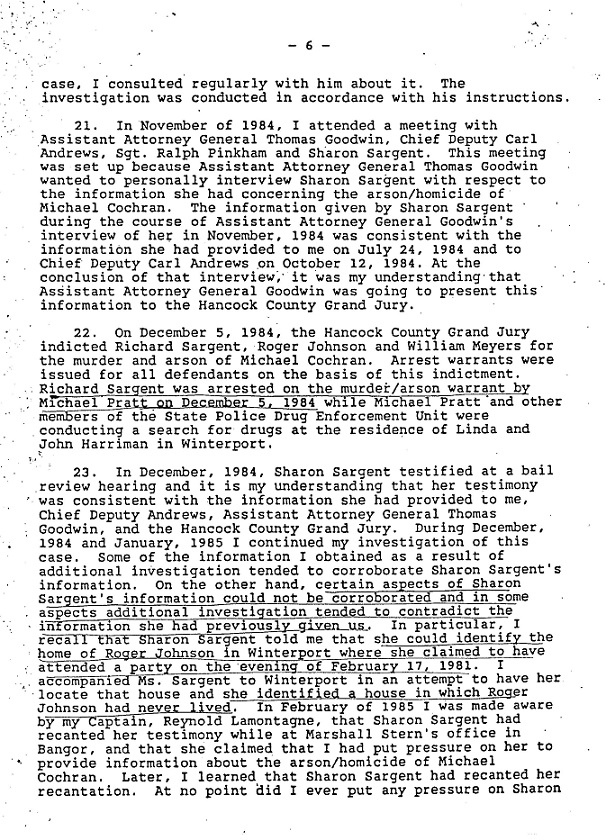 |
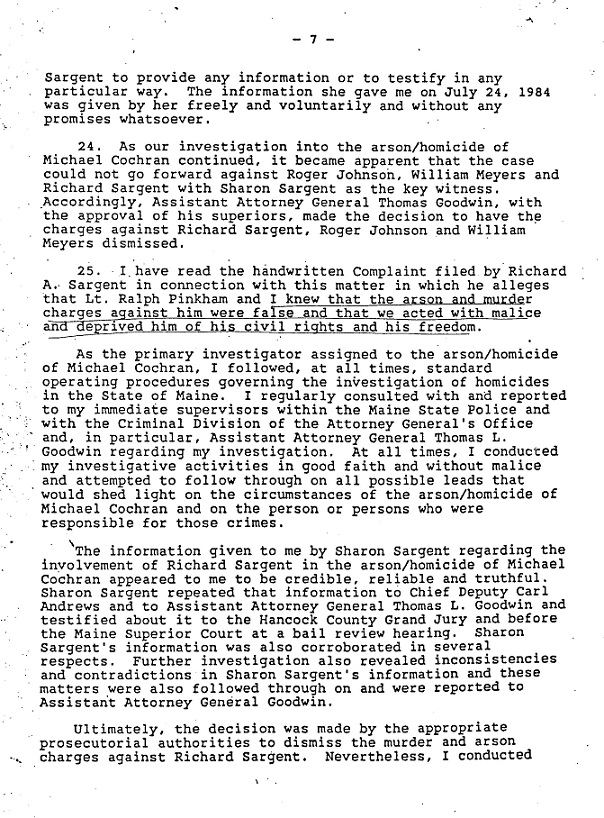 |
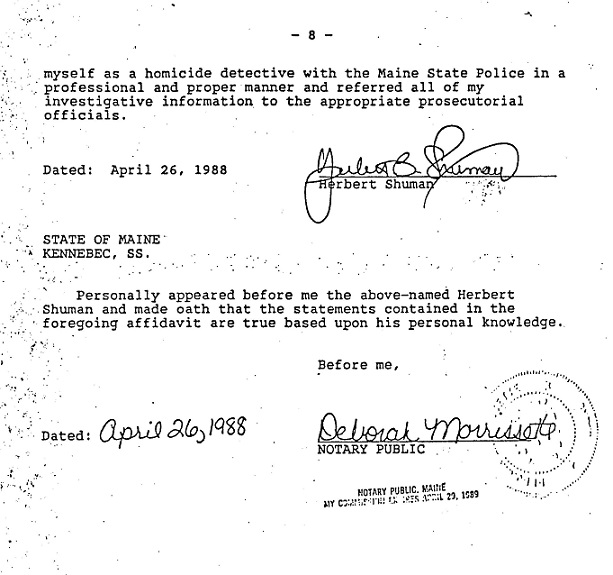 |
| Notes |
| |
#2. Shuman says it was later that Mike was
identified. The day Mike was found, Feb. 24, 1981,
the news reported that a charred body had been found in week-old fire
rubble. Shuman told the
news that "hopefully we will be making
an identification in a day or so." Jamison's fire report states that Shuman left the arson/murder scene at 4:52 pm.
He drove from Phillips Lake to Bangor (13.5 miles - 20 minutes) and had Mike's girlfriend,
Linda Gray, inside the
Bangor Police Station for an interview
at 5:45 pm according to Linda's statement. What did Shuman know that took
him directly to Mike's girlfriend if he was hoping "we will be
making an identification in a day or so?"
|
| |
#3.
It was 9:30 a.m., the next morning, Feb. 25, before Shuman visited Mike's
father at his work place requesting Mike's dental records for
identification of a body that had been found in an arson fire.
He doesn't mention he visited Mike's father requesting dental records in his affidavit. The autopsy was started at
10:40 am on Feb. 25 according to the autopsy report.
But yet, D.A. David Cox had
dismissed Mike's escape charge the previous day before the
medical examiner's vehicle left the arson/murder scene. Cox's office
closes each day at 4 pm and the ME vehicle left the scene at 1640 (4:40
pm) according to Jamison's fire report.
When Mike escaped the Bangor Daily News reported his escape and the
Maine State Police were informed. Shuman already knew Mike had
escaped from the court, Derald didn't need to advise him of it. I
believe, Shuman needed to denigrate Mike any chance he got.
I have documents that I believe show the state police and the Bangor
police knew Mike's body was lying under the pile of fire rubble for the
six days he lay there.
|
| |
#4 Shuman says he made arrangements to interview Pollard. He says
we met on March 3, 1981. How casual! “We met.” Det. Shuman and Trp. Ronald Graves travelled to Waterville with an
arrest warrant signed by MSP Det. Pinkham
to arrest Pollard. Pollard was in court in Waterville the morning of
March 3, 1981 to answer to a charge of forgery. Shuman was waiting for Pollard when he came out of court. He
had been
indicted on March 2 for reckless conduct w/a dangerous
weapon (firing 5 bullets into a family residence). Shuman arrested
Pollard and transported him to Bangor where he was arraigned, jailed and segregated from other prisoners.
The March 3, 1981
statement Shuman took from Pollard
after he was incarcerated at the Penobscot County Jail is a deceptive story about his presence at the cottage at the time of Mike’s murder.
That is how "we met."
Shuman says Pollard walked to a nearby
residence to call for a ride. Cormier and Pollard went to the Sargent residence
after killing Mike and told the family that a
body would be found in a camp fire
before Pollard went to the John Clark residence to stage a call. |
| |
#5. Shuman says he interviewed Pollard again on
March 5, 1981 and his account
of the events were consistent with his March 3, 1981 statement.
In Pollard's March 5, 1981 statement he said he heard sounds like logs
dropping on the floor (not in his March 3, 1981 statement). Fire Inspector Wilbur Ricker in his
1989
deposition said if you had enough fire to drop a rafter you would
have a temperature that you wouldn't take more than one breath and you
would go down just like you were in operating room.
Ricker was not contacted when Richard Sargent,
Roger Johnson and William Myers were
indicted for Mike's murder. Ricker said he read about it in the newspaper.
|
| |
| #6. Shuman states that he "interviewed John
Clark in an effort to corroborate Paul Pollard's story. Clark ... did
state that a young man fitting Pollard's description and wearing only
one boot had come to the Clark home to make a phone call the morning of
the fire at the Dupray camp." John Clark's statement was missing
from the state's discovery as well as Mark Ashe's statement (The first
house Pollard said he went to to call Cormier and said they weren't
home.). During the 1986
robbery trials Cormier's attorney Martha Harris
spoke with John Clark's wife and she said
there was no strangeness about this individual's shoe-wear and there was
no odor of fire or soot on Mr.
Pollard.
|
| |
7. Shuman says on April 3, 1981 (March 25, 1981),
Pollard took a polygraph examination. According to PI Carl Buchanan's
report "results and/or copy of test questions or graft never turned
over with discovery." Buchanan told me that Shuman said they lost Pollard’s polygraph test. This was Shuman's basis for eliminating Pollard as a suspect. How
could Shuman eliminate Pollard as a suspect by saying he passed a
polygraph and not produce the polygraph test?
|
| |
| 8. Carla Phair's statement was taken at
District Attorney David Cox's office. Mike wasn't murdered in Penobscot
County, DA Cox's jurisdiction. He died in Dedham, Hancock County. Yet,
Cox was controlling Mike's murder investigation. Cox was involved
in the Feb. 17-18, 1981 drug sting the morning Mike was murdered. |
| |
9. In David Dupray's Feb. 24, 1981
statement he told
Shuman that he was afraid of Percy Sargent. He said that Percy wanted him to save him. He wanted
lawyer money because he was facing rape charges and needed money. Dupray
said he did not give any money to Percy, but he lost a substantial
amount of money from the trunk of his car while it was parked at the
racketball club in Bangor.
Shuman took another
statement from Dupray on Mar. 3, 1981.
Shuman doesn't mention this statement in his affidavit. Dupray had an
attorney with him for this meeting with Shuman. According to the
Dupray's statement "Percy Sargent confronted him at the Racketball club. Percy
threatened David with bodily harm that would probably cost him $10,000.
Percy told Dupray 'I had a dream and in this dream you get severely
beaten up.'" Dupray stated that "he feels it was
Percy that
ripped off the $3.800 that was in the trunk of his car." ...
"Bob Rideout [a police informant] told Dupray that he received a call from Percy.
Rideout thought that Percy had been drinking and he thought Percy said they
planned to teach David a lesson."
|
| |
| 10. Richard Sargent |
| |
11. Shuman says that
"[A}t this stage of the investigation
it seemed clear to him that the arson/homicide of Micheal Cochran was
related to his connections and activities in the drug underworld and our
investigation in the arson/homicide was making little progress in view
of the fact that few people in the drug underworld would cooperate with
us."
I find this very offensive. I believe that Shuman and Pinkham were
unethical officers of the law. And I also believe they obstructed
justice when they refused to interview witnesses who had information about Mike's murder.
To cover for their unethical behavior they blamed Mike for his own murder saying he was
so deep in the drug underworld that they couldn't investigate his
murder. I requested another investigator be assigned to Mike's
murder, but the state refused to assign another investigator.
The following are people Shuman and Pinkham never contacted
during their abysmal investigation:
1. Percy Sargent was living in Dupray’s cottage and had harbored Mike.
Percy was in
jail when Bangor PD Lt. Roger Bryce visited David Dupray and his mother
at Bangor District Court on the morning of February 18 to tell them
their cottage burned early that morning. They told Bryce
that Percy Sargent was staying in their cottage.
Neither
Bryce, Pinkham nor Shuman went to the jail to speak with Percy Sargent.
Fire Marshal
Wilbur Ricker surprised Percy Sargent and Lionel Cormier when they
arrived at the murder scene the morning he found Mike. Ricker told
Shuman that the two men need to be looked at.
Neither
Lionel Cormier nor Percy Sargent were ever questioned.
Percy
told Derry “you want to be sure to tell Thomas Goodwin that not one
person has ever asked me about this whole case, you know; no DA, no cop,
nothing.” He also said “nobody’s ever investigated me or asked me any
questions about this or anything, you know." Derry told Shuman and
Goodwin that Percy wanted to speak with them.
Percy was never
contacted.
2. According to Percy’s mother Frances Sargent and his sister Linda
Harriman, Cormier and Pollard arrived at the Sargent residence approximately
four hours after Mike’s murder and told
the family to watch the news because they’re going to find a
body in a camp in Dedham. Neither Frances Sargent nor Linda Sargent Harriman were
ever questioned.
3. Robert Smith testified that he bailed Pollard from jail and loaned Cormier his car so Cormier, Percy, and Pollard could flee the State of Maine after they murdered Mike.
Smith was never questioned.
4. Pollard said he went to his girlfriend, Karen Murray’s residence in Rhode Island to hide after he fled the state—Murray was never questioned.
6. In Paul Pollard’s February 12, 1985 statement he said after he fled the state he called his
pseudo father, Owen Pollard, to tell him a man had died. He said Owen
told him to come home and they would take care of it.
Owen Pollard was never questioned.
That makes 7 people who had information about Mike’s murder and were never questioned.
|
|
| #12-#13-#14-#15-#16-#17 is Shuman's story of his
investigation of Mike's murder. Shuman had only one informant and she
had a criminal record and was in jail when he spoke with her. Three men were indicted on her information but the indictments against
the men were dismissed when she accused Shuman of giving her the
information she told the grand jury. The FBI later investigated the
Maine State Police officer who arrested the three men she accused of
Mike's murder. The MSP officer was dismissed from the Maine State Police for perjury
and having a sexual relation with his informant, Sharon Sargent. |
| |
18.
Shuman says that on November 5, 1984 "Harriman told me that Percy Sargent
told him that he believed Micheal Cochran had 'set him up.'" And
"Harriman also informed me that Percy Sargent told him that he made a
phone call to his brother, Richard Sargent, that night. First read
the excerpt from Shuman's Oct. 16, 1984 (which Shuman doesn't mention) interview with
Harriman. Then read the excerpt from Shuman's Nov. 5, 1984 interview with Harriman.
The initials HS: is Herbert Shuman and initials DH: is David Harriman
|
|
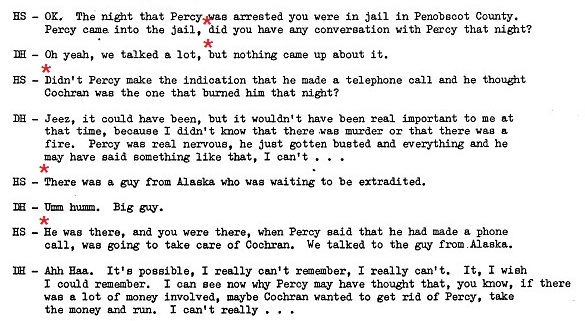 |
| |
|
An excerpt from Shuman's interview with David Harriman on Nov. 5,
1984. The initials S: is Shuman and initials H: is Harriman |
|
|
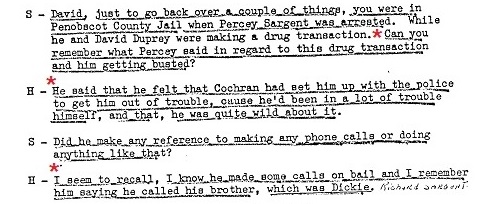 |
|
|
Richard Sargent's Private Investigator Carl Buchanan mentions this in his
19 page Investigative Report on page 12 and 13. |
|
|
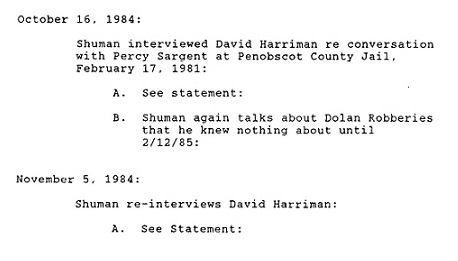 |
 |
|
| |
19. Shuman says "[A] number of the details
[Sharon Sargent] related
concerning the arson/homicide were corroborated by statements of other
individuals who were interviewed by me and other members of the
Maine State Police who were investigating this crime. Such details
included her knowledge of Cochran's arrest and escape ..."
What other sources corroborated her information? If they had
additional information why didn't they product it when the state was
"forced" to dismiss the indictments against Richard Sargent, Roger
Johnson and William Myers? Furthermore, Sharon Sargent accused
Shuman of giving her the information she told the grand jury and asked
the state to order Shuman to have no with contact her because she feared
him.
I know for a fact that Linda Gray, Mike's girlfriend, helped him escape from the courthouse
and she was the only one who helped him. She came to my home and told me she had hid Mike and wouldn't say where she
had taken him. She said because she promised him she wouldn't tell anyone. A
report
by the county sheriff says that when Mike was using the phone in
the Clerk of Courts office that morning that his girlfriend was with
him. Linda was with Mike for the 77 days that he was hiding.
Linda told Shuman in her March 3, 1981 statement that Mike stayed in
different places and she visited him every day. |
| |
| 20- 21. Shuman says he consulted regularly with
Assistant Attorney General Thomas Goodwin. I can believe that because
Goodwin's responses were always the same as Shuman and Pinkham's:
"Paul Pollard is not guilty. He ran because someone was trying to kill
him. Pollard didn't hear Richard Sargent, Roger Johnson and William
Myers tramping through the cabin pouring gas because he was deaf in one
ear." Goodwin was prepared to put three innocent men in prison.
When Sharon Sargent came forward to expose Shuman Goodwin still tried to
hang on to his arson/murder case against the men but the state was
forced to dismiss the indictments. |
| |
| 22. Shuman says Michael Pratt arrested Richard
Sargent but he doesn't say that Pratt was having a sexual affair with
Sharon Sargent, his informant. He committed perjury when he testified
about his and Sharon's affair. He was fired from the Maine State
Police. |
| |
| 23. Shuman says "certain aspects of Sharon
Sargent's information could not be corroborated and in some aspects
additional investigation tended to contradict the information she had
previously given to us. ... At no point did I ever put any
pressure on Sharon Sargent to provide any information or to testify in
any particular way." Sharon Sargent said he did and in
David Harriman Oct. 16, 1984 (3 months after Shuman's interview of
Sharon Sargent) Harriman said that he did not hear Percy say that Mike
had set him up and he didn't hear Percy say that he had sent a call to
his brother, Richard Sargent. But in his November 5, 1984
interview (The only interview Shuman uses in his affidavit) Harriman says that he did hear Percy say
that Mike had set him up and that he made a call to his brother,
Richard. What causes Harriman to change his information within three
weeks? |
| |
| 24. When the case could not go forward with
Sharon Sargent as the key witness why didn't Shuman and Pinkham use the other corroborating
statements from other individuals they claimed they had. |
| |
| 25. Shuman says "At all times, I conducted my
investigative activities in good faith and without malice ..."
I do not agree. I don't believe Shuman acted in good faith and
without malice during his investigation of my son's murder. I believe
he obstructed justice while assigned primary investigator in my son's
death. I believe he covered up facts and
committed perjury while testifying at the robbery trials in 1986. I
believe it was with malice when he threatened me with charges during a
meeting I had with him in March of 1981. I met with him to get
information on my son's murder but I left that meeting in fear of him
and fearing I would be charged for something I was not guilty of.
And I also don't think he was being very professional when I
called him to ask a question about the investigation of my son's murder
and he hung upon me. |
| |
| |











